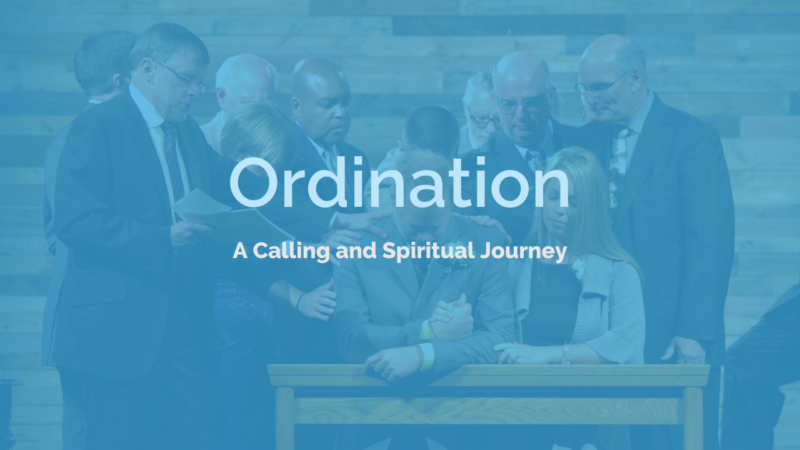Ordained pastors, preachers, theological educators, and denominational leaders all share the same credential in the Wesleyan Church: being ordained clergy. The Wesleyan Church values ordination as the highest credentialing for ministers. Ordination is more than a designation or title, but also a spiritually formative journey, an ordering, and an act of service.
Ordination as a Spiritually Formative Journey
The call to ordination is multifaceted and more than an approved legality to officiate weddings, a preparation to preach, or to administer the sacraments of Communion and Baptism. Rev. Carla Working said, “Beyond the legality, there is a deeper heart.”
For the ordained minister, ordination is part of the minister’s spiritual journey. “Ordination is a confirmation by other people, both laity and other ordained [ministers], that they see the call of God in your life, that you can lead the people of God, and that you’re prepared,” Working said, adding with a smile, “as much as you can be. A lot of ministry is fixing the plane while flying it. [Ordination is] taking the steps to be prepared.”
Working also noted ordination is a step of faith, “when you kneel there and they lay hands on you, it’s a special grace.”
As the shepherd of a local community of believers, the ordained minister sets the example. In reference to 1 Corinthians 11:1, Working paraphrased, “Follow me to follow Christ; to realistically know who God is, [the congregation will] look at the ordained minister.” The minister’s personal spiritual journey sets the tone for the congregation.
Ordination as Ordering
Dr. Aaron Perry, Director of Wesleyan Academic Initiatives, said, “Ordination is important because it is a grounding.” This grounding provides a framework for clergy and laity to work together. “Ordination is an ordering, placing one within orders and under orders,” Perry said. These orders are multifold: from the local church and its people, from the guidance of the denomination working with the local church, and from personal direction of the Holy Spirit. Perry continued, “Ministers do not have freedom to act against these orders. While the people of the church have freedom to move without consulting the church, the ordained minister is under orders and must always keep this in mind and heart. The minister is not free to move about, but must stay in step with the placement of God and the authority in which they are found.” These “orders” provide mutual accountability for the ordained clergy, the laity, and the denomination to work as a team to move forward in participating in the mission of God.
Perry continued, “In The Wesleyan Church, ordination is conferred not only by other ministers, but also by the laity. The laity [or] the people [of the congregation] have significant voice and oversight into who are the pastors and leaders in the denomination. Ordination is not simply authority ‘over’ but authority ‘for.’ Ordination reminds the minister that authority is given and given with corresponding duties and responsibilities. Authority, in part, is given through the laity and for the laity to be authorized and empowered in ministry, including evangelizing, healing, serving, teaching, and more. Ordination is important in the life of the minister because it reminds the minister she or he is authorized to serve and to authorize in service.”
While these duties and responsibilities can vary based on the specific role of the clergy, the call to serving God and the church remains consistent.
Ordination as Service
Ordination is a call to serve. “You are dedicating yourself to equipping the people of God,” Working said. She also emphasized the responsibility of ordination, there is a “recognition that you will uphold, celebrate, and promote the theology and doctrine that you’re joining. You have a responsibility to the denomination… there should be a desire to stay connected with The Wesleyan Church.” But more than responsibility come opportunities, too. Ordination “gives you a seat at the table, to serve and to have your voice heard,” said Working.
The call to serve exercises the balance of believing in the priesthood of all believers (1 Peter 2:5-9) with the important relationship between clergy and laity. Because of the priesthood of all believers, “Everyone has the responsibility of doing the work of ministry,” said Working, and the role of the ordained pastor is, “the responsibility to equip the people to do the work of ministry.”
Recent Trends in Ordination
Across the denomination, the trend in people being ordained seems to have taken a parallel dip to what so much in our culture experienced in these last few years. In 2022, 131 individuals were ordained, with only 95 ordinations occurring in 2024. However, as of July 2024, we have 1225 women and men working toward ordination in the Education and Clergy Development (ECD) process. “Enrollment with ECD is up!” said Working enthusiastically. Working also noted the process for the newer credential of Licensed Minister Permanent, or LMP, has over 200 enrolled for people “wanting to be equipped to serve in a particular place for a particular season, but not be ordained.” Working also noted the important work of laity, “the work of serving is still happening,” she said.
Interested in Ordination? Discover more HERE

